Best Cloud Storage for Business in 2025
Finding the best cloud storage for business is challenging, as each service offers something different. Depending on your size, business needs and budget, you could opt for a highly secure and private solution, or you could prioritize productivity and collaboration tools. To help you decide, we’ll take a look at the best cloud storage for business.
Key Takeaways: What Is the Best Cloud Storage for Business?
- Sync For Teams — Cheap storage and private, end-to-end encryption
- Box Business — Great native apps with Google and MS Office connections
- Egnyte — Highly customizable, with popular third-party integrations
- Dropbox Business — Robust file sharing; great native apps and integrations
- Tresorit — Good file sharing and account customization with solid security
It’s rare in today’s digitally connected world to find a business that doesn’t need cloud storage. Anything from document collaboration to sharing files is integral to business productivity. However, it can be tough to choose from the many excellent cloud storage choices. In this article, we list the best business cloud storage options.
It should come as little surprise that several cloud storage providers on this list also make the cut as the best cloud storage services overall. For the best combination of security, customization and functionality, Box is a top option for enterprise businesses.
Meanwhile, Sync for Teams offers the cheapest pricing while also providing strong security and privacy, making it the best cloud storage solution for small businesses. However, if productivity and collaboration are important aspects, several other options on the list will fit the bill.
-
06/25/2022
Updated Sync.com’s plans and pricing information.
-
06/15/2023 Facts checked
This article has been rewritten for 2023 to include updated providers, pricing and features.
Top Business Cloud Storage Services
- 1
- :
- : Unlimited GB
- :
- :
- :
- :
- 2
- :
- : 150 GB
- :
- :
- :
- :
- 3
- :
- : 100 GB
- :
- :
- :
- :
- 4
- :
- : 50 GB
- :
- :
- :
- :
- 5
- :
- : 5 GB
- :
- :
- :
- :
How We Chose the Best Cloud Storage for Business
To review a cloud service, we first have our tester actively use it for around a week, going through every available feature to see if it works as it should. We also run technical tests to see how fast a service is and how much RAM and CPU it uses. We also check its encryption methods and privacy policy for any flaws.
For our eagle-eyed readers, you may notice that our individual reviews offer scores that would seem to differ from what the list below indicates. Our reviews are balanced equally among the different areas of the service we evaluate. However, when comparing business cloud storage, some features (such as features or app integration) weigh heavier than others (for example customer service or ease of use).
Collaboration & Management Features
Collaboration and management tools are important considerations, even for smaller teams and businesses. Some cloud storage solutions for businesses include workflow and task management features.
These tools typically do not replace dedicated project management applications, but they can help you effectively monitor project progress and maintain communications with comments at the document level.
File Storage & Sharing
Without robust file storage and sharing features, cloud storage designed for businesses wouldn’t be very useful. Syncing folders and files across devices and allowing teams to organize and structure folders are important considerations. The ability to easily share files internally and externally helps to foster a productive and collaborative environment.
Privacy & Security
Security and privacy factor heavily, as poor security or questionable privacy erodes trust in a cloud storage service, especially when storing or sharing important business documents or project files. Our suggestions offer secure storage and strong privacy protections, some including end-to-end encryption.
Business Pricing
Additionally, how much business cloud storage costs is also a strong factor. In some ways, the pricing between the following business cloud storage providers vary greatly. Although none of the options offer free cloud storage for business, small business teams could get by with smaller plans.
The 5 Best Business Cloud Storage Services
Data security, app integrations and collaboration tools are critical components of an enterprise-level cloud storage service, and Egnyte has all these features and more. For small businesses concerned with privacy and security, Sync for Teams is the best choice.
However, each of the services below has something to offer businesses. Let’s take a deeper look at each option.
1. Sync for Teams – Best Cloud Storage for Small Business
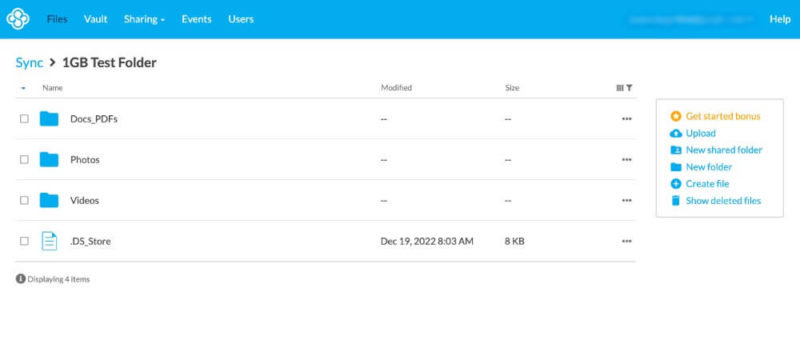
More details about Sync for Teams:
- Pricing: $72 per user per year
- Free plan: None; 30-day free trial and 30-day money-back guarantee
- Provider website: sync.com
Pros:
- Excellent security & privacy
- Easy file sharing
- Generous file versioning
- Affordable plans
Cons:
- Not very fast
- Not great for collaboration
Sync for Teams is a secure cloud storage option for small businesses offering end-to-end, zero-knowledge encryption for all accounts. This makes the service great for storing sensitive data.
File sharing and ease of use are also highlights of Sync for Teams. Secure file sharing happens in a few simple steps, with the option to password-protect the shared link or set an expiration date. Additionally, Sync for Teams has MS Office integrated, allowing the creation of new documents like Word or PowerPoint.
It’s easy to add and manage users through a dedicated tab accessible from the main account page. New users have basic access, and administrators can assign specific roles and include users in project folders. If a new custom role is required, admins can create and assign it as needed.
File Versioning
Sync for Teams makes it easy for users to review and restore previous versions of a file. The Solo and Teams business plans have 180 days of file versioning without limits to the number of files kept. Solo Pro, Pro Teams Unlimited and the Enterprise plans have a full 365 days of file versioning without any file number limit.
Accessing older file versions happens by navigating to a given file and selecting “version history.” All file versions display on the page up to the allotted time frame. Returning to an older version is as simple as selecting it and making it the current version. Restoring deleted files works similarly, and Sync will hold them for 30 days.
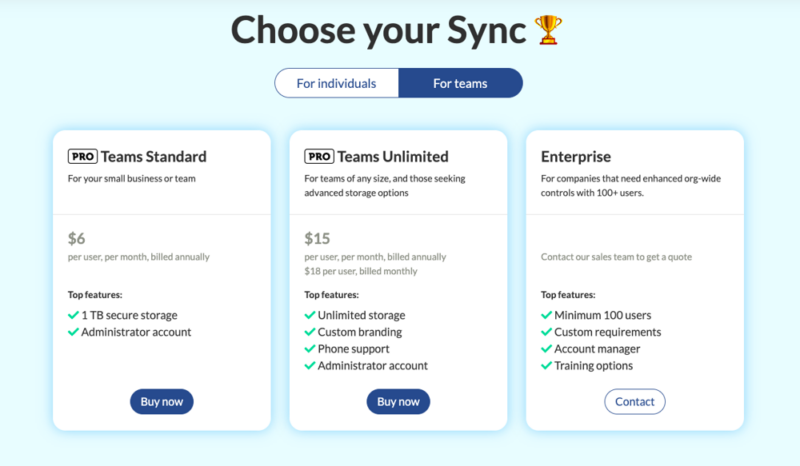
Sync for Teams is affordable; plans start at $6 per user per month for two or more users and 1TB of shared storage. That’s the lowest minimum price of any provider on this list. The Pro Teams Unlimited has a 30-day free trial, and all Sync.com plans have a 30-day money-back guarantee. Check out our Sync for Teams review to learn more.
- price per user per month, billed annually; minimum 3 users
- 1TB
- Price per user; minimum 3 users
- Unlimited GB
- Minimum 100 users
- Unlimited GB
2. Box Business – Cloud Storage Solution for Business with Third Party Integrations
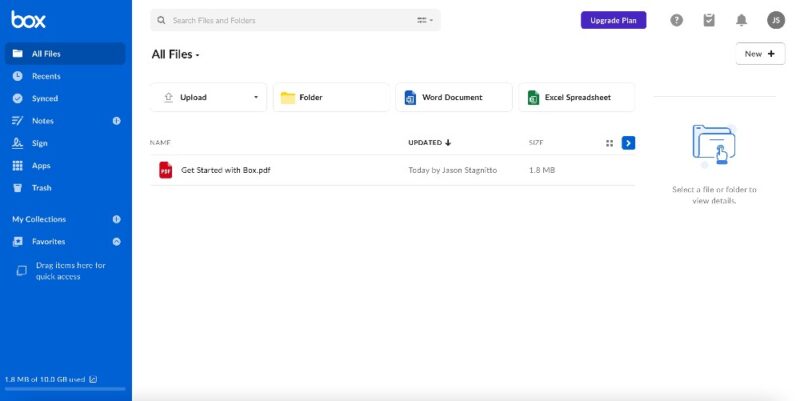
More details about Box Business:
- Pricing: $180 per user per year
- Free plan: None; 14-day free trial
- Provider website: box.com
Pros:
- Many third-party integrations
- Strong security
- Native apps
Cons:
- Slower speeds
- Paid private encryption
Box Business offers an excellent combination of strong security, popular third-party integrations and native apps that helps teams become and stay productive. Integrations to MS Office and Google Workspace allow for plenty of collaboration between individuals and teams. Additionally, Box supports connections to hundreds of other apps, such as Airtable and Zapier.
Every Box Business plan comes with access to the admin console, which contains several options and customizable settings for teams and user accounts. However, a number of features within the admin console are reserved for the higher-priced plans. Private encryption is only available as a paid add-on, called Key Safe, and it gives you total control of encryption keys.
Native Apps
Box’s native apps are excellent additions to any account. For example, Box Notes is similar to Dropbox Paper and offers real-time collaboration on documents from a web browser. You can share Box Notes internally or externally. Our Box Notes article goes into more detail.
Box Sign is another native app, as is Box Drive. Similar to DocuSign, Box Sign allows you to send or receive digitally signed documents. Box Drive is a downloadable app for desktops that functions like an external drive. With Box Drive, you can store and access your documents without taking up hard disk space.
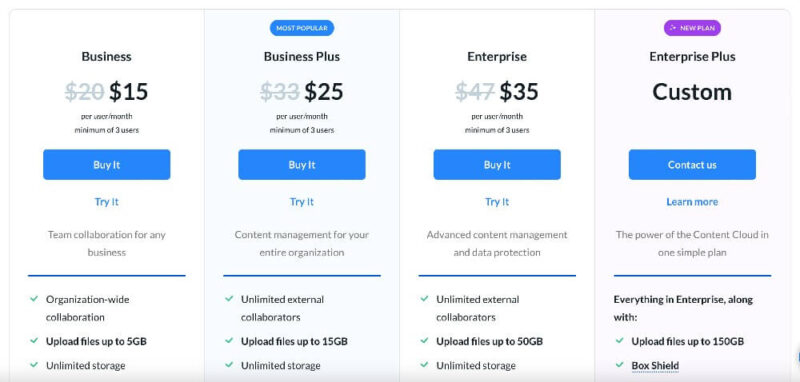
Box offers different plans for individuals, small teams and businesses. For unlimited storage, plans start at $15 per user per month, billed annually, with a minimum of three users. All business plans have unlimited storage — which is why the provider tops our review on the best unlimited cloud storage providers.
Box cloud storage for business can get expensive, although most business plans offer a 14-day free trial. To learn more, check out our Box Business review.
- 1
- :
- : 150 GB
- :
- :
- :
- :
3. Egnyte – Highly Customizable Cloud Storage Solution
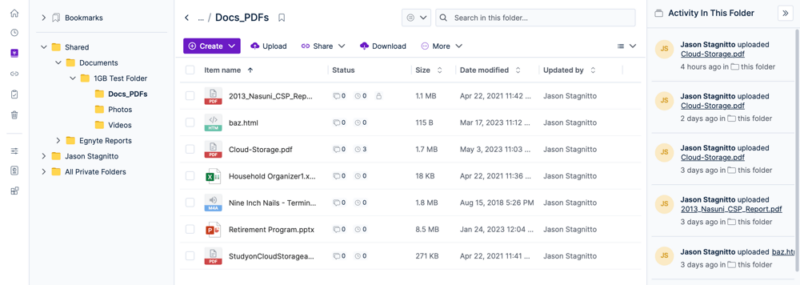
More details about Egnyte Connect:
- Pricing: $240 per user per year
- Free plan: None; 15-day free trial
- Provider website: egnyte.com
Pros:
- Excellent security
- Third-party connections
- Customizable settings
Cons:
- No zero-knowledge security
- Can be expensive
Egnyte is an enterprise file synchronization and sharing solution (EFSS) designed to support businesses and teams. It has native apps for both Windows and Mac and third-party integrations to Google Workspace and MS Office. Additionally, it supports connections to hundreds of other apps, including Slack, Trello and Zoom, to name a few.
Egnyte’s cloud storage platform supports businesses looking to manage teams on a granular level. It has a built-in task manager and workflow system that, while helpful, are basic and won’t replace dedicated apps. Engyte also lets you manage your account with a robust settings and configurations menu.
Settings and Configurations
Egnyte is also a secure cloud storage solution for businesses. It offers one of the most customizable experiences for user and team management. User types include admins, power users or standard users. Admins can configure options such as password requirements or enable two-factor authentication.
Other options include setting up email notifications for when you’re approaching the limits of your storage allotment. Additionally, accounts come with a private folder, and admins can adjust its size. Egnyte has a separate section for reports and audits, letting admins monitor everything from storage usage to file-sharing data.
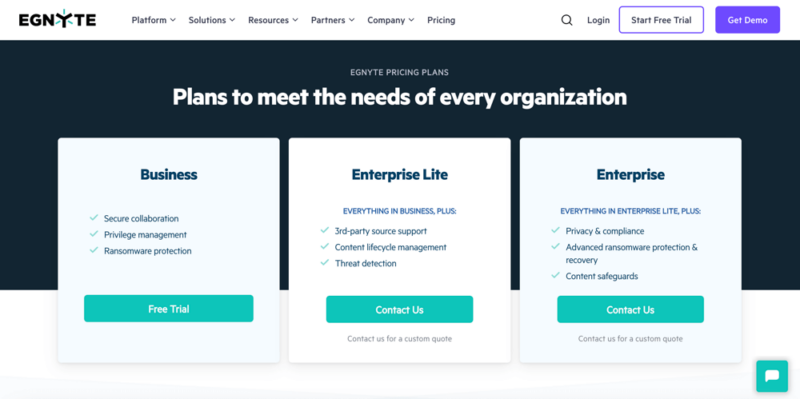
Egnyte has three business plans: Business, Enterprise Lite and Enterprise. The Business plan costs $20 per user per month, billed annually for 10 users (meaning a minimum of $200 per month) that share 1TB of data. Prices increase — significantly, in some cases — with a la carte-style add-ons. You’ll need to contact Egnyte for Enterprise pricing. Our Egnyte review has more details on this service.
- 1-10 users max.
- 1TB
- Price per user; Secure collaboration; Privilege management; Ransomware protection
- 1TB
- Everything in Business; 3rd-party source support; Content lifecycle management; Threat detection
- 1TB
- Everything in Enterprise Lite; Privacy & compliance; Advanced ransomware protection & recovery; Content safeguards
- 1TB
4. Dropbox Business – Best File Sharing for Small Business
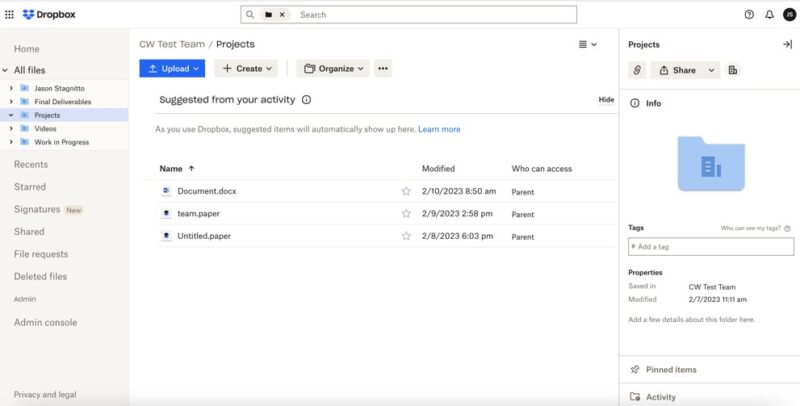
More details about Dropbox Business:
- Pricing: $180 per user per year
- Free plan: None; 30-day free trial
- Provider website: dropbox.com
Pros:
- Excellent file sharing
- Block-level & selective sync
- Native apps
Cons:
- Expensive
- No private encryption (yet)
Dropbox Business takes the best Dropbox features — file sharing and collaboration — and adds tools that support productivity and collaboration for teams. The Dropbox Business native apps are a significant feature of the service.
One example is Dropbox Paper, a real-time collaborative web-based document editor. Other native apps include eSign (securely send and receive documents) and Capture, which lets you record your screen.
File synchronization is a strong feature, as Dropbox Business supports block-level and online-only sync. Block-level sync updates only the changes in a given file, while online-only sync lets you determine the folders to sync with a cloud account.
Additionally, for the privacy-minded, Dropbox recently purchased Boxcryptor, with plans to bring private encryption storage to its business plans.
Third-Party Integrations
Dropbox Business supports many third-party integrations. Popular options include Google Workspace and MS Office. Users can create new Google or Microsoft files directly in a Dropbox account when connected.
Other integration options include Slack, Trello and Notion. Most connections work within the respective app by creating a dedicated Dropbox tab or folder. For example, connecting Dropbox Business and Slack lets you share files directly in the Slack app or have conversations within Dropbox using the file preview feature.
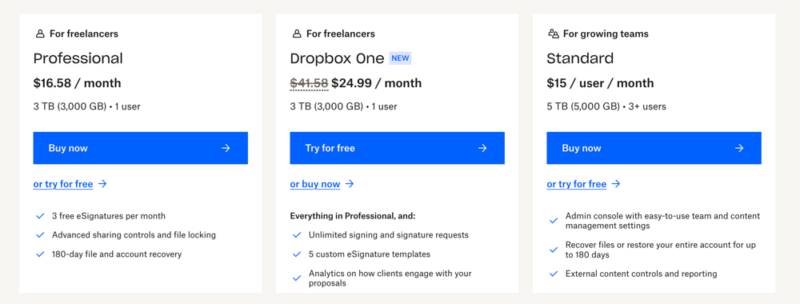
Dropbox Business plans have individual and team options, with a separate plan that includes DocSend. The Standard plan comes with 5TB of shared storage for a minimum of three users. It costs $15 per user per month when billed annually. Most Dropbox Business plans have a 30-day free trial. For more information, read our Dropbox Business review.
- minimum 3 users
- 5TB
- Price per user
- 3TB
More plans
- Price per user, 30-day free trial (minimum 3 users)
- 9TB
- Price & storage per user, 30-day free trial. (minimum 3 users)
- 15TB
- minimum 1 user
- 3TB
1-month plan
- minimum 3 users
5. Tresorit – Secure Cloud Storage for Business
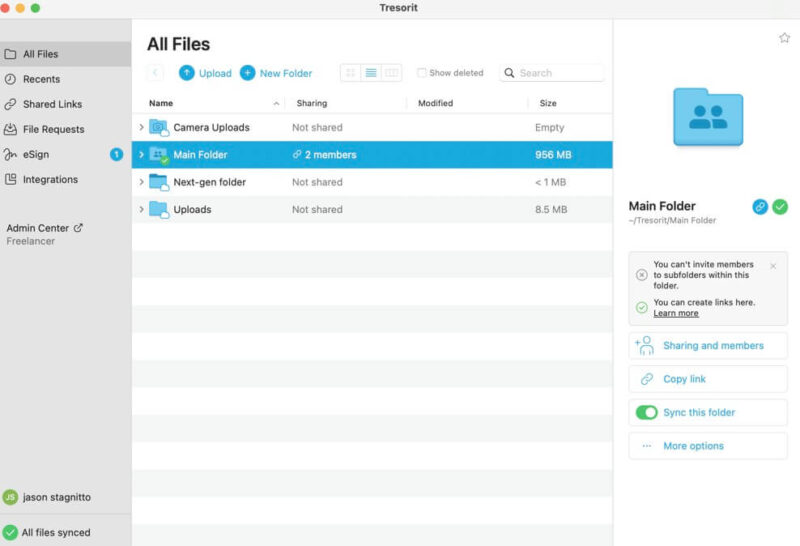
More details about Tresorit:
- Pricing: $174 per user per year
- Free plan: 3GB; 14-day free trial
- Provider website: tresorit.com
Pros:
- Strong security & privacy
- Strong file sharing
- Selective sync
Cons:
- Not the fastest option
- Can get expensive
Tresorit cloud storage has many tools designed to support businesses and teams. All plans come with encryption for email attachments. Additionally, the downloadable Tresorit Drive app provides access to account documents and folders on computers, even offline. For team managers and administrators, Tresorit has a robust admin center with customization options and account settings.
Perhaps the main drawback to Tresorit is that it charges extra for features that come standard with some of its competitors. The ability to send and receive digital signatures will cost you extra with Tresorit eSign. Additionally, if you want to encrypt the contents of your email in addition to any attachments, you’ll also have to pay for an add-on.
Admin Center
Tresorit provides detailed data and analytics through its admin center that support managers and administrators. Every business account comes with access to this managerial tool. The dashboard is a snapshot of high-level account information, showing the number of users, storage used and the number of devices connected.
The admin center provides more granular information in other tabs. The “users” tab lets you manage users and permissions, as well as invite new users to the team. The “security” tab lets account managers enable two-factor authentication requirements for all accounts. Some elements are reserved for the higher-priced plans, such as setting policies specific to account usage or data security.
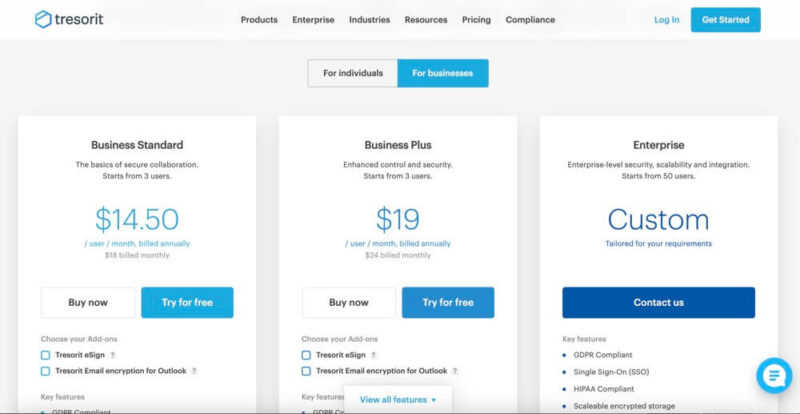
Tresorit isn’t the most affordable option available and could become cost-prohibitive when accounting for the paid add-ons. On the Business Standard plan, each user gets 1TB of storage; the plan costs $14.50 per user per month when billed annually. We cover more in our Tresorit review.
- 3GB
- 1TB
- 4TB
More plans
- Price per user (billed annually), Storage per user, User count: 3-9
- 1TB
- Price per user (billed annually), Storage per user, User count : 10+
- 2TB
- Price per user (billed annually), Storage per user, User count : 100+
Honorable Mentions
While the above five choices are, in our opinion, the best business cloud storage providers, there are a few other options in this crowded and competitive industry that deserve your consideration. Depending on your business’s needs, they might be the perfect fit for you. Two such services are Zoho WorkDrive and pCloud Business.
Zoho WorkDrive
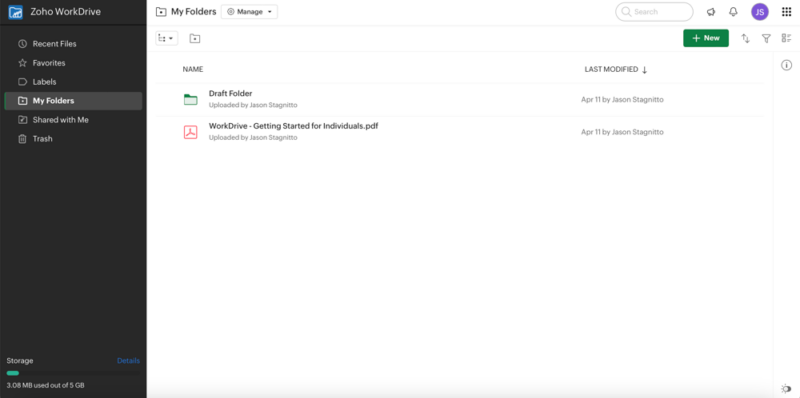
Zoho WorkDrive has a suite of native apps that supports nearly every business function. Many of its apps enhance collaboration and productivity among teams. Navigating around in Zoho WorkDrive is a seamless experience where you can create favorite folders for quick access or add labels to support projects and teams.
Overall, Zoho WorkDrive is an affordable business cloud storage provider; the Business plan costs $108 per year for three users and 5TB of data storage. However, those prices come with limits, so Zoho WorkDrive probably isn’t best for larger teams or complex projects.
- One user
- 5GB
- Users: 3+
- 1TB
- Users: 3+
- 3TB
- Users: 3+
- 5TB
pCloud Business
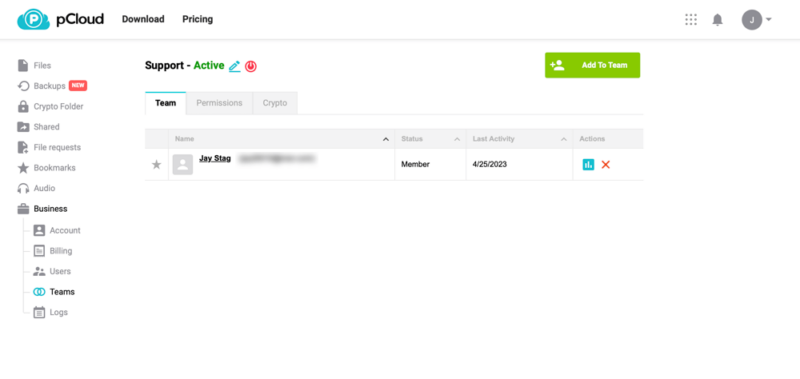
pCloud is an excellent cloud storage provider. Its business plans add a dedicated space to manage teams and users on top of a service with excellent security and file-sharing capabilities.
Within the “business” tab, you can add new members and create teams. Additionally, logs show granular information on user activity. Perhaps best of all, a business account — costing per year for three users and of storage — includes pCloud Crypto, giving teams a private encryption folder.
However, pCloud business does not have any native apps that support collaboration between team members. Additionally, there are no third-party integrations, which could be a deal-breaker for some teams. pCloud supports many file types, but you won’t be able to work with them collaboratively within the app; you can only preview files. We cover the service in detail with our pCloud review.
- 10GB
- 500GB
- 2TB
More plans
- + FREE Encryption
- 2TB
- + FREE Encryption
- 10TB
- Price per user (minimum 3)
- 1TB
- Price per user (minimum 3)
- 2TB
- Encryption for pCloud Drive
How Is Cloud Storage Used in Business?
Most businesses use cloud storage as a repository for project files. Additionally, businesses use these services to support collaboration and productivity among teams. File sharing, both internally and externally, is a critical feature. The more customization and flexibility administrators have to manage users and teams, the better.
Native apps and third-party integrations are important considerations, especially for businesses or teams using a preferred ecosystem like Google or Microsoft. Collaborating in real-time on a document between team members is an excellent feature for business cloud storage.
Final Thoughts: Cloud Storage for Business
Every cloud based storage for business on our list does an excellent job of providing business options with strong security that increase productivity and enhance collaboration. Each service offers a unique value proposition; some are better for small businesses, while others excel at supporting larger teams.
If you’re looking for cloud solutions where you can keep your files available even when there’s no internet connection, check out our article on the best offline cloud storage providers.
Do you use any of these business cloud storage providers? If so, what has been your experience using a given service? Did we miss a great cloud storage for businesses? Let us know in the comments section below. Thanks for taking the time to read our article.
FAQ: Cloud Storage for Businesses
The best cloud storage solution for a business comes down to a business’s requirements and needs. Sync for Teams and Tresorit are excellent options if top-notch security and privacy are most important to your small business. Egnyte, Box or Dropbox Business will meet your needs if productivity and collaboration are at the top of your list.
The costs associated with business cloud storage vary significantly across different cloud services. Some have additional paid add-ons, which can increase the overall costs. Most have different plan choices that scale up in storage and cost.
Most businesses that operate in today’s digitally-connected world would find it tough to collaborate and share files without using a cloud service. If your business uses computer-based documents or interacts with digital signatures, for example, then moving to the cloud is likely the right choice.




